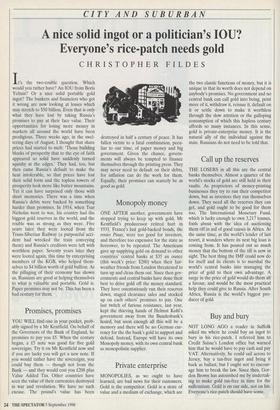Monopoly money
ONE AFTER another, governments have stopped trying to keep up with gold. Mr Kentfield's predecessor retired hurt in 1931. France's last gold-backed bonds, the rentes Pinay, were too good for investors, and therefore too expensive for the state as borrower, to be repeated. The Americans gave up supplying gold on demand to other countries' central banks at $35 an ounce (this week's price: $280) when their fair- weather friends from London threatened to turn up and clean them out. Since then gov- ernments and central banks have done their best to drive gold off the money standard. They have ostentatiously run their reserves down, staged clearance sales and stocked up on each others' promises to pay. One last twitch of furious resistance, last year, kept the thieving hands of Helmut Kohl's government away from the Bundesbank's hoard, but soon enough all this will be a memory and there will be no German cur- rency for the the bank's gold to support and defend. Instead, Europe will have its own Monopoly money, with its own central bank as monopolistic supplier.


























































 Previous page
Previous page